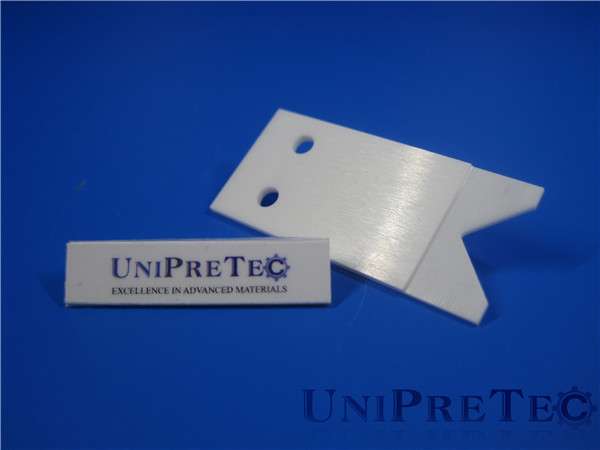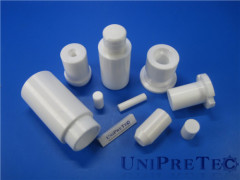
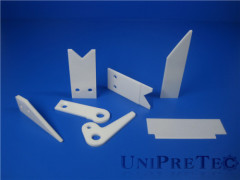
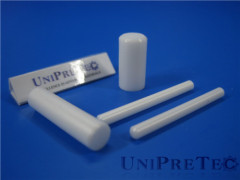
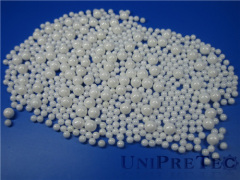
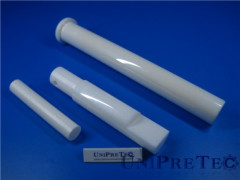
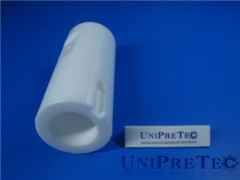
Partially Yttria Stabilized ZrO2 Zirconium Oxide Zirconia Ceramics
| Min. Order: | 100 Piece/Pieces |
|---|---|
| Trade Term: | FOB |
| Payment Terms: | L/C, T/T, WU |
| Supply Ability: | 2000 pieces/month |
| Place of Origin: | Fujian |
Company Profile
| Location: | Xiamen, Fujian, China (Mainland) |
|---|---|
| Business Type: | Manufacturer, Trading Company |
| Main Products: | Boron Nitride, Boron Carbide, Silicon Nitride, Slicon Carbide, Zirconia Ceramics |
Product Detail
| Model No.: | customized |
|---|---|
| Means of Transport: | Ocean, Air |
| Brand Name: | UNIPRETEC |
| Density: | 6.00 g/cm3 |
| Color: | White, Yellow |
| Thermal Conductivity: | 2.2 W/m.K |
| Compressive Strength: | 2500 Mpa |
| Flexural Strength: | 900 Mpa |
| Max. Working Temp.: | 800 C |
| Young's Modulus: | 205 Gpa |
| Vicker's Hardness: | 12 Gpa |
| Crystal Structure: | tetragonal |
| Water Absorption: | 0% |
| Production Capacity: | 2000 pieces/month |
| Packing: | carton box with foam |
| Delivery Date: | 30 days |
Product Description
Partially Yttria Stabilized ZrO2 Zirconium Oxide Zirconia Ceramics

Zirconia is an extremely refractory material. It offers chemical and corrosion inertness to temperatures well above the melting point of alumina. The material has low thermal conductivity. It is electrically conductive above 600°C and is used in oxygen sensor cells and as the susceptor (heater) in high temperature induction furnaces. With the attachment of platinum leads, nernst glowers used in spectrometers can be made as a light emitting filament which operates in air.
1. Key Properties of Zirconium Oxide
• Use temperatures up to 1000°C
• High density
• Low thermal conductivity (20% that of alumina)
• Chemical inertness
• Resistance to molten metals
• Ionic electrical conduction
• Wear resistance
• High fracture toughness
• High hardness
2. Typical Uses of ZrO2
• Precision ball valve balls and seats
• High density ball and pebble mill grinding media
• Rollers and guides for metal tube forming
• Thread and wire guides
• Hot metal extrusion dies
• Deep well down-hole valves and seats
• Powder compacting dies
• Marine pump seals and shaft guides
• Oxygen sensors
• High temperature induction furnace susceptors
• Fuel cell membranes
Characteristics | Unit | 95% Al2O3 | 99% Al2O3 | ZrO2 | GP-Si3N4 | HP-BN | Glass Ceramic |
Crystal Structure | - | hexagonal | hexagonal | tetragonal | hexagonal | hexagonal | - |
Color | - | white | ivory | white | gray | white | white |
Density | g/cm³ | 3.65 | 3.88 | 5.95 | 3.22 | 2.26 | 2.55 |
Water Absorption | % | 0 | 0 | 0 | 0 | 0.0-1.0 | 0 |
Young's Modulus | Gpa | 280 | 350 | 205 | 295 | 670 | 65 |
Vickers Hardness | Gpa | 14 | 20 | 12 | 18-20 | - | - |
Flexural Strength @R.T. | Mpa | 280 | 300 | 900 | 650 | 51 | 100 |
Compressive Strength @R.T. | Mpa | 2000 | 2500 | 2200 | 2200 | 23 | 500 |
Thermal Conductivity @R.T. | W/(m•K) | 18-25 | 30 | 2.2 | 25 | 20 | 1.70 |
Thermal shock resistance | ΔT(C°) | 220 | 180-200 | 280-350 | 450-650 | >1500 | 25-100 |
Max. Working Temperature @R.T. | C° | 1500 | 1700 | 850 | 1200 | 960 | 800 |
Volume Resistivity @R.T. | Ω・cm | >10^15 | >10^14 | >10^12 | >10^14 | 10^13 | 10^16 |
Dielectric Constant (1 MHz @R.T. ) | - | 9.50 | 9.80 | 26 | 8.20 | 4.08 | 6.02 |
Dielectric Strength | kV/mm | 16 | 22 | - | 16 | 375 | 40 |


